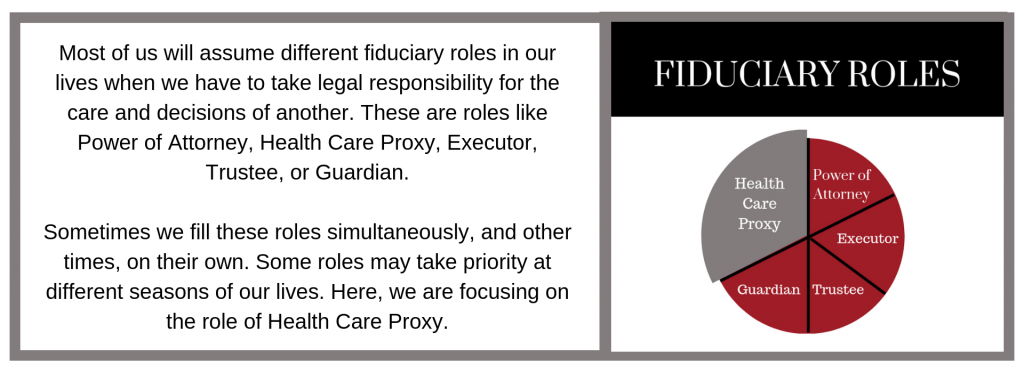You Need a Health Care Proxy. Now What?

A health care proxy, or medical power of attorney, is a legal document that gives someone else, known as the health care agent, the power to make medical decisions on your behalf during any time that you are incapacitated.
Who should have a health care proxy?
If you are a competent adult 18 years of age or older, then you have the legal right to appoint a health care agent to make medical decisions on your behalf in the event you lack the mental capacity to make those decisions yourself. You would appoint this agent by signing a legal document in the presence of two witnesses.
Who may serve as my health care agent?
In general, your agent should be someone that you trust would make health care decisions as you would if you were able to make them yourself, including decisions about life-sustaining treatments. You should choose a person that, after consulting with your health care providers and considering your diagnosis, prognosis, treatments, and side effects, will make decisions according to your wishes.
When can my health care agent act for me?
The authority of the health care agent begins after your treating physician determines that you lack the capacity to make or communicate health care decisions and ends when you regain decision-making ability. This could be temporary, such as the case with a severe urinary tract infection or being temporarily unconscious or in a coma. Quite often it is due to advanced age or illness that is not expected to improve, in which case your agent would be called upon to make decisions for the remainder of your lifetime.
What are the consequences of not having a health care proxy?
If it is determined that you lack the ability to make medical decisions and you have not signed a health care proxy to appoint an agent, then guardianship proceedings would be initiated in the local probateProbate can refer to the process of settling the estate of a deceased person. Read More court to have a guardian appointed to make some or all decisions about your health and personal care. After considering the medical evidence, a judge would ultimately decide whether the person requesting to be your guardian is a suitable choice. You may or may not be required to attend the hearing in court. Once appointed, a legal guardian would thereafter be required to report to the court annually about your condition.
What type of power does this give to my agent?
As a legal document, the proxy permits the named agent to confer with your medical team, review and access medical records, and consent to or refuse treatments, including surgeries, Do Not Resuscitate (“DNR”) and Cardiopulmonary Resuscitation (“CPR”) directives, blood transfusions, and administering medications. However, if the proxy document omits certain authority, then your agent may not be able to act on your behalf. For example, without explicit language authorizing your health care agent to sign a contract for your admission to a long-term care facility, such as a nursing home, this power would have to be sought instead from the courts through a guardianship proceeding.
If I have a health care proxy, do I still need a living will?
The most difficult decision that a health care agent has to make often centers around whether to cease or continue life-sustaining treatments designed to prolong life. A living will, or advance directive, is written evidence of your wishes about the use of life-prolonging procedures, such as feeding tubes and breathing machines, if it is determined that you have an incurable condition and will no longer experience a meaningful life. A living will is not legally binding, meaning that your health care agent or medical team can refuse to follow your wishes. However, a living will provides your agent with your wishes in writing, which can help protect them when making a decision that is in line with the directive.
Can I revoke or change my health care proxy?
Yes! This could be done by verbally communicating with your health care team but the best approach is to put the revocation or change in writing. If you wish to simply change the person named as your agent, then you could execute a new health care proxy that, by law, will override the previous one. A word of caution here: it is common for hospitals and medical centers to ask you to sign a health care proxy upon admission. If you already have one in place that includes special language, such as nursing home admission powers, then signing a new proxy will override your current document. This is often undesirable because the hospital forms omit these important powers.
What are the differences between a MOLST (Medical Orders for Life-Sustaining Treatment) and a health care proxy?
A MOLST is a Massachusetts medical document, rather than a legal document, that provides current medical orders for life sustaining treatment. A MOLST is signed by the clinician and the patient (or the patient’s health care agent, if the patient is incapacitated.) Here is a helpful chart that shows the differences between a MOLST and a health care proxy.
Interested in seeing what a day in the life of a health care proxy might look like? Read Marc’s take on this, 24 Hours as a Health Care Proxy.
If you want to dig deeper into health care proxies, see the Massachusetts Health Care Proxy law to learn more.





